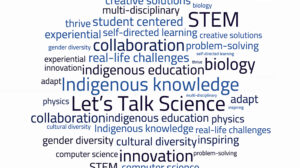As other professionals begin their workday, do they worry about their professional integrity becoming the next casualty in the Facebook comments? Principals sure do. The role of a school administrator has always been challenging, but the advent of social media has had a profound impact on the position, adding another yet another layer of complexity to the role. In my own practice I noticed a shift; social media made me less an educational leader and more a school manager. The dynamics of parents’ use of social media increasingly dictated my day and with it, shaped my professional identity.
What has changed in the principalship?
I began to wonder what my job really was, and where my responsibilities lay in this relatively unexplored terrain of social media navigation. In addition to the job description, is this what a school administrator does? I realized I was spending hours outside of work perusing Facebook community groups, certain parents’ Instagram profiles and Twitter feeds to see what was being posted about the school and my teachers so I could be prepared for potential fallout. Rather than communicate directly with the school, the same parents over and over were taking to social media to post incendiary remarks on Facebook about private disciplinary decisions made regarding their child (and others) and airing them to the online community in an effort to prove they were in the right and the school was in the wrong. This began happening more and more frequently over increasingly trivial matters: the chef changes in the cafeteria, the sign-out sheets for the washroom, and the inequity of some lockers with one shelf vs. those with two. In all this firefighting, how was I able to be a leader in education as I was purported to be? How was I able to support and inspire children against this toxic social media backdrop? I had become a school manager consumed by dealing with collateral damage of parental online demands and activity. What was my professional identity?
At District meetings social media was a constant topic of discussion; what parents were upset about or how a new parent group had sprouted up to replace an outlawed one. I noticed there was an increasingly negative tone regarding online platforms and how much they were impacting their everyday work. In referring to social media as the “Fifth Estate” and defining it as “an intersection of virtual influence in which embedded networks of individuals within social media may bring to bear change” (p. 2), Knake et. al. (2021) discussed in fascinating fashion how the public can shape discussions and impact education. Blumenreich and Jaffe-Walter’s (2015) account of a fierce parent-driven Facebook movement launched in response to proposed school reforms in Montclair, New Jersey illustrates the power that parents hold thanks to social media.
Why social media and why now?
Social media growth is on the rise with over 13 new users every second (Hootsuite, 2022). That’s 1,166,400 new users worldwide every single day. Age of usership is an important figure to consider in why social media has permeated many aspects of the education system. Looking at generational labels, Millennials, who are born from 1981 to 1996, and Gen Z, born from 1997 onward (Dimmock, 2019) comprise most parents with students in the k-12 school system, and the number of Gen Z parents on the rise. Gen Z is currently the largest demographic group globally and their social media use exceed three hours per day (Hootsuite, 2022). Hootsuite’s annual report (2022) surmised that these, “Digital natives are driving where social media is headed next.” These statistics demonstrate the magnitude of social media and how increasing numbers of parents have only known a digitally networked life; this is how they communicate. Facebook is currently one of the spaces most utilized by parents (Duggan et al., 2015; Gruzd & Mai, 2020), however, more and more parents, given their age, are taking to Instagram, YouTube, and video apps like TikTok.
Social media sites are no longer platforms where people are simply posting their favourite recipes and sharing photos of their pets. They are potentially anonymous sounding boards for individuals to dissect every perceived or actual infraction. In addition to this, users are getting much of their daily news from social media, making the platforms ubiquitous and risking conflation of individual opinions with broadly supported realities by legitimate news sources. By understanding where parents are coming from in their online interactions, principals can better navigate social media comments related to education and get to the heart of parents’ intentions behind their posts. Social media’s prevalence in the current ‘age of influence’ has left an indelible mark on how people communicate and consume information (Schaffer, 2020). There have been multiple studies on the power social media holds as a tool of influence in the fields of politics, marketing and legal decision making (Ashbrook, C. & Zalba, A. 2021; Robinson, N. & Shan, J., 2021; Yakar, B., 2021), and I would suggest that education is certainly not immune to its’ reach.
How does all this this impact Principals?
There has been a shift in how administrators perceive the relationship between home and school, partially due to the “parallel universe of social media” (Alberta Teachers’ Association [ATA], 2019) where administrators expressed concerns about the school being surveilled and having to work tirelessly to pre-empt any fallout digitally by keeping their many platforms updated. Pempek et al. (2009) remind us that social media wields the power to directly impact ones’ self-perception due, in part, to the ease with which one can instantaneously share and receive feedback from others, and principals are not immune.
Misinformation and Disinformation Concerns
Although useful for communication, social media is also a potential liability for principals as while it allows for transmission of information in a concise way, social media is rife with disinformation and misinformation (Crilley & Gillespie, 2019; Government of Canada, 2022; Gonzalez-Padilla & Tortolero-Blanco, 2020). Cinelli et al. (2021) are quick to surface a concern that social media narrows exposure to varying opinions as algorithms are designed to create an echo chamber for users, and English (2017) agrees that it serves to reinforce existing biases. Bates et al. (2017) reinforce that parents are not immune to this type of inaccurate information sharing. Whether this sharing is done under the guise of being misinformed, the unintentional sharing of false information, or disinformed with the intention to deceive others, it is problematic in online social media groups as accusations and false reporting can take on a life of its’ own when it comes to discussing teachers and education.
While acknowledged that principals’ time is increasingly being consumed by managing issues and conflicts arising from social media use in the school community (ATA, 2019), the explicit impact parents are having on principal’s professional identities through their use of social media remains unexplored. This dearth in knowledge leaves principals to navigate these socially informed realities independently, which can have a negative impact on individual professional identity and principals’ ability to successfully perform their crucial leadership work.
Looking to the future
Along with ensuring there are enough supply teachers, the bus incident has been dealt with, the timesheets signed, Assistive Tech orders processed, and everyone attended their PLC meeting, social media has quickly become part of the day-to-day reality that school administrators must contend with. If we are to ensure a future of engaged, supported, and confident principals, it is essential to understanding what impact behaviour by stakeholders on these online platforms is having on how principals see themselves in their roles. With further insight, principals can be better supported by school boards, educational policy will be better informed, and future educational leaders will be better prepared for the “real world”; one that may not embrace social media but will have a more thorough understanding of its influence, and the power parents can wield through it.
ReferencesAlberta Teachers’ Association. (2019). Alberta school leadership within the teaching profession 2019: Seismic shifts and fault lines: Experiencing the highs, lows, and shadows. https://www.teachers.ab.ca/SiteCollectionDocuments/ATA/Publications/Research/COOR-101-26%20School%20Leadership%20in%20the%20Teaching%20Profession.pdf
Ashbrook, C. C., & Zalba, A. R. (2021). Social media influence on diplomatic negotiation: Shifting the shape of the table. Negotiation Journal, 37(1), 83–96. https://doi.org/10.1111/nejo.12353
Bates, J., McKeever, C., Reilly, J., & Roulston, S. (2017). Fact or Fiction? How to spot fake news. A guide for teachers and parents. https://pure.ulster.ac.uk/ws/files/11623427/FAKE%20NEWS%20RESOURCE%20ULSTER%20UNIVERSITY.pdf
Blumenreich, M., & Jaffe-Walter, R. (2015). Social media illuminates: some truths about school reform. Phi Delta Kappan, 97(1), 25–28. https://doi.org/10.1177/0031721715602232
Cinelli, M., Morales, G. D. F., Galeazzi, A., Quattrociocchi, W., & Starnini, M. (2021). The echo chamber effect on social media. Proceedings of the National Academy of Sciences of the United States of America.118(9), e2023301118. https://doi-org.login.ezproxy.library.ualberta.ca/10.1073/pnas.2023301118
Crilley, R., & Gillespie, M. (2019). What to do about social media? Politics, populism and journalism. Journalism, 20(1), 173–176. https://doi.org/10.1177/1464884918807344
Dimock, M. (2019). Defining generations: Where millennials end, and generation Z begins. Pew Research Center. https://www.pewresearch.org/fact-tank/2019/01/17/where-millennials-end-and-generation-z-begins/
Duggan, M. (2015). Mobile Messaging and Social Media 2015. Pew Research Center. August 2015. Available at: http://www.pewinternet.org/2015/08/19/mobile-messaging-and-social-media-2015/
English, R. (2017) Anti-vax truthiness: How social media echo chambers reinforce anti-vax beliefs in parents. In Ahern, T C (Ed.) Social media: Practices, uses and global impact (Media and Communications – Technologies, Policies and Challenges). Nova Science Publishers, United States of America, pp. 173-194. Government of Canada. (November 6, 2022). Online disinformation. https://www.canada.ca/en/canadian-heritage/services/online-disinformation.html
González-Padilla, D. A., & Tortolero-Blanco, L. (2020). Social media influence in the COVID-19 Pandemic. International Braz j Urol, 46(1). https://doi-org.login.ezproxy.library.ualberta.ca/10.1590/s1677-5538.ibju.2020.s121
Gruzd, A., & Mai, P. (2020) The State of Social Media in Canada 2020. Ryerson University Social Media Lab. Version 5. https://dx.doi.org/10.2139/ssrn.3651206
Hootsuite. (November 10, 2022). Digital 2022: Global overview report. https://www.hootsuite.com/resources/digital-trends
Knake, K. T., Daly, A. J., Frank, K. A., Rehm, M., & Greenhow, C. (2021). Educators meet the Fifth Estate: Social media in education. The Elementary School Journal, 122(1), 1-7.
Pempek, T. A., Yermolayeva, Y. A., & Calvert, S. L. (2009). College students’ social networking experiences on Facebook. Journal of Applied Developmental Psychology, 30(3), 227-238. DOI: 10.1016/j.appdev.2008.12.010
Robinson, N., & Shan, Jaclyn. (2021). Taxing the Legitimate Business of Social Media Marketing in the Age of Influence. Texas Review of Entertainment & Sports Law, 22, 1–36. https://doi.org/10.1086/715479
Schaffer, N. (2020). The Age of Influence: The Power of Influencers to Elevate Your Brand. Harper Collins Leadership.
Yakar, B. (2021). The Influence of social media over the decision-making process. John Marshall Law Journal, 14(2), 36–56.
THE AUTHOR:
Erika E. Nelson, PhD Student. Principal Instructor, Studies in Educational Leadership / University of Alberta










